
| Capital | : Bandar Seri Begawan |
| National Population | : 305,100 |
| Language | : Bahasa Melayu |

The family is the focal point of the social structure. The Bruenian family is the extended family and includes aunts, uncles, and cousins as well as close friends. Members of the extended family are expected to remain loyal to each other and the family.
As a result of this Brunei is a hierarchical culture. Age and position are revered. From a young age, children are taught to subjugate their own desires for the good of the entire family and to respect elders without question. In addition they also learn that it is through family support that they accomplish goals.

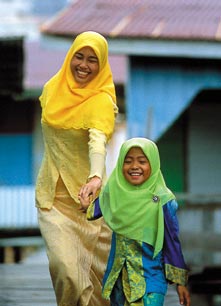 Brunei's culture mainly derived from the Old Malay World, a territory which covered the Malay Archipelago. Brunei’s culture is therefore deeply rooted in its Malay origins, which are reflected in the nation’s language, architecture, ceremonies, and customs governing daily life. Though various foreign civilisations have played a role in forming Brunei’s rich history, the traditions of the Old Malay World have left an indelible mark on the culture of modern Brunei.
Brunei's culture mainly derived from the Old Malay World, a territory which covered the Malay Archipelago. Brunei’s culture is therefore deeply rooted in its Malay origins, which are reflected in the nation’s language, architecture, ceremonies, and customs governing daily life. Though various foreign civilisations have played a role in forming Brunei’s rich history, the traditions of the Old Malay World have left an indelible mark on the culture of modern Brunei.
Today, Bruneians are predominantly Malay, though significant Chinese, Indian and indigenous Bornean populations add to the cultural makeup of Brunei. Brunei’s blend of cultures, customs, beliefs and customs is therefore very similar to that of Malaysia. The nation’s official language is Malay, but English is widely spoken by most of the population, and most signs in the country are written in Roman script.
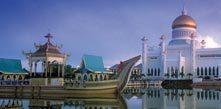 If Malay traditions are Brunei’s cultural root, then Islam is its heart. The nation’s Malay Islamic Monarchy is a uniquely Bruneian blend combining the best of Malay culture with the teachings of Islam and a mutual respect between ruler and subjects. This national philosophy is aimed at forging a stronger sense of identity as well as fostering unity and stability, and it forms the backbone of Bruneian cultural identity. While Brunei is indeed a devoutly Muslim country, the national philosophy is one of respectful tolerance, allowing for the practice of other religions and beliefs.
If Malay traditions are Brunei’s cultural root, then Islam is its heart. The nation’s Malay Islamic Monarchy is a uniquely Bruneian blend combining the best of Malay culture with the teachings of Islam and a mutual respect between ruler and subjects. This national philosophy is aimed at forging a stronger sense of identity as well as fostering unity and stability, and it forms the backbone of Bruneian cultural identity. While Brunei is indeed a devoutly Muslim country, the national philosophy is one of respectful tolerance, allowing for the practice of other religions and beliefs.

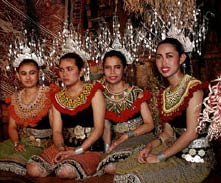 The Southeast Asian island of Borneo — third largest island in the world — has captivated the imagination of explorers and travellers for centuries with its alluring mix of indigenous culture and untamed rainforest.
The Southeast Asian island of Borneo — third largest island in the world — has captivated the imagination of explorers and travellers for centuries with its alluring mix of indigenous culture and untamed rainforest.
Approximately 16 million people live on the island of Borneo, which is shared by Malaysia, Indonesia and Brunei Darussalam. The island's population is comparatively low for the region, owing largely to the fact that up until a few decades ago, Borneo was completely covered by dense rainforest with poor soil for agriculture. This, combined with rugged terrain, unnavigable rivers and the fierce head-hunter reputation of its inhabitants, ensured that the island remained 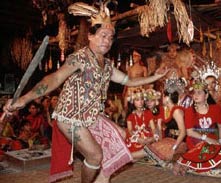 underdeveloped for many years, giving Borneo a legendary mystique as one of the most mysterious and exotic places on Earth. For thousands of years, this image was fairly close to the truth. Borneo has been inhabited for at least 35,000 years, and life for many Borneans has changed little over the centuries. Most people lived in harmony with nature, leading nomadic or semi-nomadic lifestyles, travelling over vast areas in search of wild boar and other products of the forest.
underdeveloped for many years, giving Borneo a legendary mystique as one of the most mysterious and exotic places on Earth. For thousands of years, this image was fairly close to the truth. Borneo has been inhabited for at least 35,000 years, and life for many Borneans has changed little over the centuries. Most people lived in harmony with nature, leading nomadic or semi-nomadic lifestyles, travelling over vast areas in search of wild boar and other products of the forest.
Around three thousand years ago, traders from other lands began to frequent Borneo, connecting the island to a larger trading network extending to China, India, and 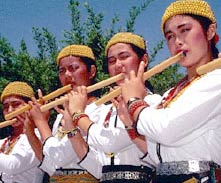 beyond. Locals collected exotic products like bird's nests and sandalwood for trade abroad but otherwise, life went on as before. Approximately 500 years ago, Islam arrived to the island, and a number of Muslim kingdoms were established, the largest of which was Brunei, which once controlled most of the northern coast. The name Borneo is in fact derived from the name Brunei.
beyond. Locals collected exotic products like bird's nests and sandalwood for trade abroad but otherwise, life went on as before. Approximately 500 years ago, Islam arrived to the island, and a number of Muslim kingdoms were established, the largest of which was Brunei, which once controlled most of the northern coast. The name Borneo is in fact derived from the name Brunei.
Today, Borneo is still home to thousands of indigenous ethnic minorities which add to the island’s diversity and local colour. While Borneo is rapidly modernising, indigenous culture still thrives, evident in the many traditional longhouse communities that dot the landscape of Brunei and in the native handiworks and crafts they continue to produce. Headhunting, however, is a pastime which thankfully has retreated into legend!

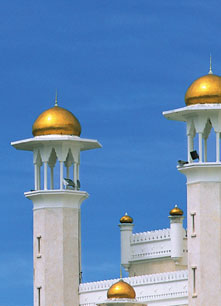 Brunei Darussalam is richly endowed with a cultural heritage that the government and the people have worked tirelessly to maintain. The nation’s Arts and Handicraft Centre, for example, is a living testimony to the preservation and the proliferation of the arts and crafts for which Brunei was once renowned, including boat making, silversmithing, bronze tooling, weaving and basketry. Visitors will also find Malay weaponry, wood carvings, traditional games, traditional musical instruments, silat (the traditional art of self defence) and decorative items for women to be some of Brunei’s most unique cultural offerings.
Brunei Darussalam is richly endowed with a cultural heritage that the government and the people have worked tirelessly to maintain. The nation’s Arts and Handicraft Centre, for example, is a living testimony to the preservation and the proliferation of the arts and crafts for which Brunei was once renowned, including boat making, silversmithing, bronze tooling, weaving and basketry. Visitors will also find Malay weaponry, wood carvings, traditional games, traditional musical instruments, silat (the traditional art of self defence) and decorative items for women to be some of Brunei’s most unique cultural offerings.
The introduction of Islam, of course, also dramatically changed Brunei’s cultural landscape, adding its own distinct artistic forms. The nation’s mosques and other Islamic sites of importance are all works of art in themselves, and many contain some of the most striking examples of Islamic arts that can be found outside the Arab world. Examples include gilded Holy Korans, ceremonial items and the intricate mosaics that adorn several monuments throughout the nation’s four districts.

 Epicures will enjoy the vast array of cuisine that Brunei offers, ranging from home-cooked local specialties to the finest of international cuisines.
Epicures will enjoy the vast array of cuisine that Brunei offers, ranging from home-cooked local specialties to the finest of international cuisines.
One will find that Bruneian fare generally exudes a unique flavour of cultural fusion due to the influence of the various nations that have left their mark on Brunei’s culture. Arab, Indian and Chinese traders, European explorers and, of course, Malay and indigenous Bornean peoples have each introduced their own cooking styles and ingredients, adding to the masterful fusion that makes Brunei’s cuisine memorable.
(Source: Brunei Tourism)










